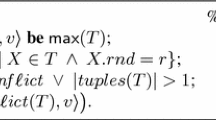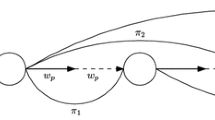Abstract
In this paper, we study uncontended complexity of anonymous k-set agreement algorithms, counting the number of memory locations used and the number of memory updates performed in operations that encounter no contention. We assume that in contention-free executions of a k-set agreement algorithm, only “fast” read and write operations are performed, and more expensive synchronization primitives, such as CAS, are only used when contention is detected. We call such concurrent implementations interval-solo-fast and derive the first nontrivial tight bounds on space complexity of anonymous interval-solo-fast k-set agreement.

Similar content being viewed by others
Notes
Informally, an obstruction-free algorithm ensures that every operation running solo from any configuration eventually returns. An abortable algorithm ensures that every operation returns in a finite number of its own steps but, in case when it encounters contention, a special abort response can be returned.
References
Aspnes, J., Ellen, F.: Tight bounds for adopt-commit objects. Theory Comput. Syst. 55(3), 451–474 (2014)
Attiya, H., Guerraoui, R., Hendler, D., Kuznetsov, P.: The complexity of obstruction-free implementations. J. ACM. 56(4), 1–24 (2009)
Borowsky, E., Gafni, E.: Generalized FLP impossibility result for t-resilient asynchronous computations. In: Proceedings of the 25th Annual ACM Symposium on Theory of Computing, STOC 1993, pp. 91–100. (1993)
Bouzid, Z., Raynal, M., Sutra, P.: Anonymous obstruction-free (n, k)-set agreement with n \(-\) k + 1 atomic read/write registers. In: Proceedings of the 19th International Conference on Principles of Distributed Systems, OPODIS 2015, pp. 18:1–18:17. (2015)
Buhrman, H., Garay, J.A., Hoepman, J., Moir, M.: Long-lived renaming made fast. In: Proceedings of the 14th Annual ACM Symposium on Principles of Distributed Computing, PODC 1995, pp. 194–203. (1995)
Capdevielle, C., Johnen, C., Kuznetsov, P., Milani, A.: On the uncontended complexity of anonymous consensus. In: Proceedings of the 19th International Conference on Principles of Distributed Systems, OPODIS 2015, pp. 12:1–12:16. (2015)
Chaudhuri, S.: More choices allow more faults: set consensus problems in totally asynchronous systems. Inf. Comput. 105(1), 132–158 (1993)
Delporte-Gallet, C., Fauconnier, H., Kuznetsov, P., Ruppert, E.: On the space complexity of set agreement. In: Proceedings of the 34th ACM Symposium on Principles of Distributed Computing, PODC 2015, pp. 271–280. (2015)
Fich, F.E., Herlihy, M., Shavit, N.: On the space complexity of randomized synchronization. J. ACM 45(5), 843–862 (1998)
Fischer, M.J., Lynch, N.A., Paterson, M.: Impossibility of distributed consensus with one faulty process. J. ACM 32(2), 374–382 (1985)
Gafni, E., Guerraoui, R.: Generalized universality. In: Proceedings of the 22nd International Conference on Concurrency Theory, CONCUR 2011, pp. 17–27. (2011)
Gelashvili, R.: On the optimal space complexity of consensus for anonymous processes. In: Proceedings of the 29th International Symposium on Distributed Computing, DISC 2015, pp. 452–466. (2015)
Giakkoupis, G., Helmi, M., Higham, L., Woelfel, P.: An \(O(\sqrt{n})\) space bound for obstruction-free leader election. In: Proceedings of the 27th International Symposium on Distributed Computing, DISC 2013, pp. 46–60. (2013)
Guerraoui, R., Ruppert, E.: Anonymous and fault-tolerant shared-memory computing. Distrib. Comput. 20(3), 165–177 (2007)
Hadzilacos, V., Toueg, S.: On deterministic abortable objects. In: Proceedings of the 32nd ACM Symposium on Principles of Distributed Computing, PODC 2013, pp. 4–12. (2013)
Herlihy, M.: Wait-free synchronization. ACM Trans. Program. Lang. Syst. 13(1), 124–149 (1991)
Herlihy, M., Luchangco, V., Moir, M.: Obstruction-free synchronization: double-ended queues as an example. In: Proceedings of the 23rd International Conference on Distributed Computing Systems, ICDCS 2003, pp. 522–529. (2003)
Herlihy, M., Shavit, N.: The topological structure of asynchronous computability. J. ACM 46(6), 858–923 (1999)
Herlihy, M., Wing, J.M.: Linearizability: a correctness condition for concurrent objects. ACM Trans. Program. Lang. Syst. 12(3), 463–492 (1990)
Lamport, L.: A fast mutual exclusion algorithm. ACM Trans. Comput. Syst. 5(1), 1–11 (1987)
Loui, M.C., Abu-Amara, H.H.: Memory requirements for agreement among unreliable asynchronous processes. Adv. Comput. Res. 4, 163–183 (1987)
Luchangco, V., Moir, M., Shavit, N.: On the uncontended complexity of consensus. In: Proceedings of the 17th International Conference on Distributed Computing, DISC 2003, pp. 45–59. (2003)
Moir, M., Anderson, J.H.: Wait-free algorithms for fast, long-lived renaming. Sci. Comput. Program. 25(1), 1–39 (1995)
Saks, M.E., Zaharoglou, F.: Wait-free k-set agreement is impossible: the topology of public knowledge. SIAM J. Comput. 29(5), 1449–1483 (2000)
Yang, J., Neiger, G., Gafni, E.: Structured derivations of consensus algorithms for failure detectors. In: Proceedings of the 17th Annual ACM Symposium on Principles of Distributed Computing, PODC 1998, pp. 297–306. (1998)
Zhu, L.: A tight space bound for consensus. In: Proceedings of the 48th Annual ACM SIGACT Symposium on Theory of Computing, STOC 2016, pp. 345–350. (2016)
Author information
Authors and Affiliations
Corresponding author
Additional information
Partially supported by the ANR project DESCARTES ANR-16-CE40-0023. The Petr Kuznetsov was supported by the ANR project DISCMAT, under Grant Agreement Nos. ANR-14-CE35-0010-01.
Rights and permissions
About this article
Cite this article
Capdevielle, C., Johnen, C., Kuznetsov, P. et al. On the uncontended complexity of anonymous agreement. Distrib. Comput. 30, 459–468 (2017). https://doi.org/10.1007/s00446-017-0297-z
Received:
Accepted:
Published:
Issue Date:
DOI: https://doi.org/10.1007/s00446-017-0297-z




